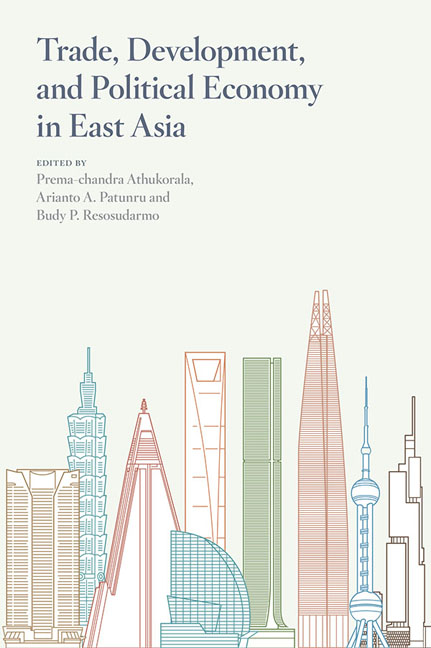Book contents
- Frontmatter
- Contents
- Tables
- Figures
- Contributors
- Foreword
- Acknowledgments
- Glossary
- 1 Introduction
- PART 1 TRADE
- PART 2 DEVELOPMENT
- PART 3 POLITICAL ECONOMY
- 11 Rethinking the role of the state in ASEAN
- 12 The ill-fated currency board proposal for Indonesia
- 13 What are grain reserves worth? A generalised political economy framework
- References
- Index
12 - The ill-fated currency board proposal for Indonesia
from PART 3 - POLITICAL ECONOMY
Published online by Cambridge University Press: 19 May 2017
- Frontmatter
- Contents
- Tables
- Figures
- Contributors
- Foreword
- Acknowledgments
- Glossary
- 1 Introduction
- PART 1 TRADE
- PART 2 DEVELOPMENT
- PART 3 POLITICAL ECONOMY
- 11 Rethinking the role of the state in ASEAN
- 12 The ill-fated currency board proposal for Indonesia
- 13 What are grain reserves worth? A generalised political economy framework
- References
- Index
Summary
In February 1998 Indonesia toyed briefly with the idea of introducing a currency board system as a means of extricating itself from the Asian financial crisis. Although the then president Suharto announced his government's intention to implement such a system, international and domestic opposition was so vociferous that he aborted the plan. In my view, this opposition was ill-informed. Moreover, it was motivated, to a considerable extent, by a desire to use the crisis to force a president widely disliked among the urban intelligentsia to discontinue some of his favoured economic policies—if not to bring about an end to his presidency—rather than giving top priority to dealing with the crisis itself. The nature of the crisis as it played out in Indonesia remains poorly understood, such that an analysis of the currency board proposal provides an opportunity to correct some misunderstandings and dispel some of the myths about this major episode in Indonesia's modern history. In this chapter I argue that in fact Suharto's embrace of the proposal was sensible, and that it was motivated by the desire to restore macroeconomic stability—which would have been not only to his own benefit but also that of Indonesia's citizens.
BACKGROUND
The Asian financial crisis began to engulf Indonesia in July 1997. It had started in Thailand as a consequence of severe mismanagement of the balance of payments in that country. Specifically, Thailand had clung to a pegged exchange rate for many months in spite of rapidly dwindling foreign exchange reserves, a fact that it managed to hide from public view for some time by selling its reserves forward and failing to disclose this fact (King 2001, 441). When the inevitable could be postponed no longer, Thailand was forced to devalue its currency suddenly and without warning, causing shock and consternation among investors worldwide who, until that time, had regarded the Southeast Asian region as a safe and profitable place in which to lend and invest.
Indonesia was tarred with the same brush, despite the fact that for many months its central bank had been fighting to prevent appreciation of the currency rather than depreciation, as a consequence of which it had accumulated very large international reserves (Figure 12.1)—quite the opposite of the Thai case.
- Type
- Chapter
- Information
- Trade, Development, and Political Economy in East AsiaEssays in Honour of Hal Hill, pp. 216 - 234Publisher: ISEAS–Yusof Ishak InstitutePrint publication year: 2014



